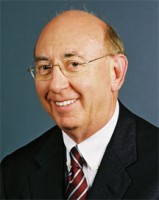John Niederhuber's bio:

John E. Niederhuber, MD, recently joined Inova Health System as Executive Vice President and CEO of the Inova Institute for Translational Research and Personalized Medicine. Prior to that he served as Director of the National Cancer Institute, one of the National Institutes of Health from 2006 until July, 2010.
During his tenure as NCI Director, Dr. Niederhuber shaped the Nation’s investment in cancer to address areas that are likely to pay the largest health dividend. He began The Cancer Genome Atlas, an effort to comprehensively identify the genomic changes in all major cancer types and subtypes. In addition to genomic studies of cancer and work in cancer immunotherapy, programs in nanobiology, systems biology, investigations into tumor microenvironment, cancer initiating cells, and subcellular imaging have benefited under his direction.
Dr. Niederhuber is recognized by his peers as a visionary leader in oncology. He daily puts into practice his expertise as both a cancer physician and a basic research scientist. His colleagues have acknowledged his leadership and accomplishments by electing him vice president and president of the Society for Surgical Oncology and president of the Association of American Cancer Institutes. He has served as a member of the C-Change (a community of executives from government, business, and the non-profit community dedicated to conquering cancer) and as a member of the CEO Roundtable on Cancer. Dr. Niederhuber is a member of the Institute of Medicine of the National Academy of Sciences, recognizing his outstanding scientific accomplishments and commitment to service in health sciences.
Dr. Niederhuber is an adjunct investigator in his own Laboratory of Tumor and Stem Cell Biology in NCI’s Center for Cancer Research. His current research focuses on factors in the tumor microenvironment, in particular on cancer activated fibroblasts (CAFs) that lead to increased malignancy. MicroRNAs have been found to play a role in establishing the CAF phenotype. The laboratory is further investigating the origin and role of cancer stem-like cells in the initiation of malignancy. The laboratory is utilizing the NCI 60 cell line to investigate reliable cancer stem cell markers and is studying the role of tissue stem cells, thought to be precursors of cancer stem cells, in the establishment of malignancies of infectious origin. Both these avenues of study are geared towards the discovery novel targets for cancer therapy.
As a surgeon, Dr. Niederhuber’s clinical focus has been on gastrointestinal cancer, hepatobiliary (liver, bile duct, and gallbladder) cancer, pancreatic cancer and breast cancer. Recognized for his pioneering work in hepatic artery infusion chemotherapy, he was the first to demonstrate the feasibility of totally implantable vascular access devices which dramatically changed the administration of systemic chemotherapy.
Prior to coming to NCI, Dr. Niederhuber was Director of the University of Wisconsin Comprehensive Cancer Center and a professor of surgery and oncology (member of the McArdle Laboratory) at the University of Wisconsin School of Medicine. Earlier in his career, he chaired the Department of Surgery at Stanford University and held professorships at the John Hopkins University School of Medicine and at the University of Michigan.
A native of Steubenville, Ohio, Dr. Niederhuber is a graduate of Bethany College of West Virginia (receiving an honorary doctorate in 2007) and the Ohio State University School of Medicine. He trained in surgery at the University of Michigan.
Dr. Niederhuber has no relevant relationships to disclose.
John Niederhuber's posts:
No posts found.
